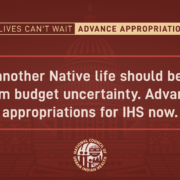In a Divided Fiscal Climate, House Advances Interior Bill with Advance Appropriations and a Modest Increase for Indian Health Service
The bill advanced to the Full Committee on Wednesday and includes $7.078 billion for IHS, $2.6 billion less than the amount requested by the President.
On July 18, 2023, the House Appropriations Subcommittee on Interior, Environment, and Related Agencies released the Committee Bill Report for the fiscal year (FY) 2024 budget with $115,156,000 for Urban Indian health. The bill appropriates $25.4 billion for Interior, Environment, and Related Agencies, which is $13.4 billion below the fiscal 2023 levels and $21.3 billion below the Biden Administration’s request. However, the bill rescinds $9.37 billion in funding for programs established in the Inflation Reduction Act, resulting in the final program level of $34.79 billion. Despite the sizeable cut to the Interior, Environment, and Related Agencies bill and reducing funding for nearly every account to below FY23 enacted levels, the Indian Health Service (IHS) received a 2.2% increase.
The report and bill were approved by the House Subcommittee on Interior on July 13, 2023 and approved with amendments by the full House Appropriations Committee on July 19, 2023. The bill authorizes $7.078 billion for IHS— an increase of $149 million from FY23 but $2.6 billion below the President’s request. Advance appropriations for IHS was maintained for FY25 and received an increase to $5.8 billion from $4.9 billion in FY24. Other key provisions include: $3 million for generators at IHS/Tribal Health Programs/Urban Indian Organizations (UIOs), $6 million for the Produce Prescription Pilot Program for Tribes and UIOs to increase access to produce and other traditional foods, as well as $35 million for Tribal Epidemiology Centers (TECs). A more detailed analysis follows below.
“While the proposed funding for Indian health by the House falls short of the full funding amount requested by the Tribal Budget Formulation Workgroup, NCUIH is grateful for the Committee’s commitment to securing funding for IHS with advance appropriations in Fiscal Year 2025 at the Fiscal Year 2024 enacted amount. We thank Chair Mike Simpson and Ranking Member Chellie Pingree for their continued efforts to ensure that Native lives are not at-risk because of funding disputes.” – Francys Crevier (Algonquin), CEO, National Council of Urban Indian Health (NCUIH).
- Bill Report with Urban Indian Health Line Item
- Draft House Interior Appropriations Bill
- Bill Summary
Bi-Partisan Support for IHS Funding and Advance Appropriations in Bill Hearing
On July 19, 2023, the House Appropriations Committee completed the markup of the FY24 Interior, Environment, and Related Agencies bill. The bill was passed out of committee 33 to 27 and referred to the House Floor. The Majority Leadership will now work to schedule the bill for a vote on the House floor. They will also work with Senate Leadership to negotiate a final bill text for passage in both chambers. The Senate Appropriations Committee has scheduled a markup for the Senate FY24 Interior, Environment, and Related Agencies bill for July 27, 2023, at 10:30a.m.
During the Full Appropriations Committee markup, Representative Mike Simpson (R-ID-2) expressed his commitment to providing stable funding for IHS, “I am pleased that the bill provides a fiscal year 2025 advance appropriation for the Indian Health Service and it’s very important that we do that. I made a commitment from the start of this that we were not going to balance this budget on the backs of our Indian brothers and sisters, and we kept that commitment in this bill. It is a bipartisan commitment. We have a moral and a trust responsibility to the Indians of this country, and we need to make sure that we are trying to address that. We still have a long way to go, but we are moving in the right direction.”
“This is an extraordinarily good bill from a Native American standpoint. I was quite shocked; I go through these bills very carefully cause that’s a passionate area of interest. I want to thank all four current chairmen and the 3 former chairmen for working together. Chairman Simpson started us on this course of trying to begin to address many, many years of neglect and broken treaty responsibilities. The members on both sides of the aisle have been enormously helpful with this… in particular I want to thank the Chairman for keeping in advance appropriations for the Indian Health Service which is absolutely critical. There was a situation where whenever we had a government shutdown or differences, we shut down healthcare systems on reservations. It is the only healthcare system we have that gets almost all of its money from discretionary dollars. That was extraordinary,” – Representative Tom Cole (R-OK-4).
“…I think we made great, great, strides and I am so excited about our opportunity with the Indian Health Service, which we know is in desperate need for federal assistance to get it in the place where people can continue to get their healthcare,” – Representative Rosa DeLauro (D-CT-3).
| Line Item | FY23 Enacted | FY24 TBFWG Request | FY24 President’s Budget | FY24 House Proposed |
| Urban Indian Health | $90,419,000 | $973,590,000 | $115,150,000 | $115,150,000 |
| Indian Health Service | $6,958,223,000 | $50,996,276 | $9,700,000,000 | $7,078,223,000 |
| Advance Appropriations | $5,129,458,00 | $9,100,000,000 | $5,129,458,00 | $5,878,223,000
|
Background and Advocacy
On March 9, 2023, President Biden released his budget request for FY24 which included $9.7 billion for IHS and proposed mandatory funding for IHS from FY 2025 to FY 2033 to the amount of $288 billion over-ten years as well as exempting IHS from sequestration. This mandatory formula would culminate in $44 billion for IHS in FY 2033, to account for inflation, staffing increases, long-COVID treatment, and construction costs. This move from discretionary to mandatory funding is essential as noted in the IHS Congressional Justification, “While the progress achieved through the enactment of advance appropriations will have a lasting impact on Indian Country, funding growth beyond what can be accomplished through discretionary spending is needed to fulfill the federal government’s commitments to Indian Country.” On March 17, 2023, IHS published their Fiscal Year (FY) 2024 Congressional Justification with the full details of the President’s Budget, which includes $115 million for urban Indian health – a 27% increase above the FY 2023 enacted amount of $90.42 million.
- President’s FY 2024 Budget
- IHS FY 2024 Congressional Justification
- NCUIH Analysis of President’s FY 2024 Budget
Full Funding, Maintain Advance Appropriations, and Mandatory Funding as Priorities
NCUIH requested full funding for urban Indian health for FY 2024 at $973.59 million for urban Indian Health in FY24 in accordance with the Tribal Budget Formulation Workgroup recommendations. NCUIH also requested that advance appropriations be maintained for the Indian Health Service (IHS) until mandatory funding is achieved. The marked increase for FY24 is a result of Tribal leaders, over several decades, providing budget recommendations to phase in funding increases over 10-12 years to address growing health disparities that have largely been ignored.
On March 9, 2023, NCUIH CEO Francys Crevier (Algonquin), testified before and submitted public witness written testimony to the House Appropriations Subcommittee on Interior, Environment, and Related Agencies regarding FY 2024 funding. NCUIH requested full funding for IHS at $51.41 billion and Urban Indian Health for FY 2024 as requested by the Tribal Budget Formulation Workgroup (TBFWG), maintain advance appropriations for IHS, and support of mandatory funding for IHS.
NCUIH recently worked closely with Representatives Gallego and Grijalva on leading a Congressional letter to the House Committee on Appropriations for FY 2024. The letter has bipartisan support and calls for support for Urban Indian Health based on the TBFWG’s recommendation and to maintain advance appropriations for IHS until such time that authorizers move IHS to mandatory spending. On April 4, 2023, a group of 12 Senators sent a letter to the Senate Interior Appropriations Committee with the same requests.
Bill Highlights
Indian Health Service: $7.078 billion
- Bill Report, Pg.2 : “The bill provides $2,582,452,000 for the Bureau of Indian Affairs (BIA), $1,399,504,000 for the Bureau of Indian Education (BIE), and $7,078,223,000 for the Indian Health Service (IHS) in funding available in fiscal year 2024.”
Urban Indian Health: $115 million
- Bill Report, pg. 90: “The bill includes $115,156,000 for this program, which will help to expand access to urban Indian program care services.”
Mandatory Funding: Contract Support Costs and Tribal 105(l) leases
- Bill Report, pg. 44: ” The Committee recommends an indefinite appropriation estimated to be $342,000,000 for contract support costs incurred by Indian Affairs as required by law and does not include the Administration’s mandatory proposal”
- Bill Report, pg. 44 :” The Committee recommends an indefinite appropriation estimated to be $64,000,000 for Payments for Tribal Leases incurred by Indian Affairs as required by law and does not include the Administration’s mandatory proposal”
- The Biden Administration included Contract Support Costs and Tribal 105(l) leases as mandatory costs. The Committee outlined in the bill report, “It does not include the Administration’s proposal to make these costs mandatory.”
- NCUIH along with 22 other Tribes and Native organizations advocated for these tribal sovereignty payments as mandatory in a letter to Congressional appropriators.
Dental Health: $288 million
- Bill Report pg. 88: “The recommendation includes $288,230,000 for the Dental Health program, including $8,844,000 for staffing at new facilities and $31,288,000 to expand access to dental care.”
Equipment: $42 million
- Bill Report, pg. 91: “The recommendation continues $500,000 for TRANSAM and provides an increase of $10,264,000 above the fiscal year 2023 level for additional medical equipment at Federally and Tribally-operated healthcare facilities.”
- Bill Report , pg. 91: “The recommendation directs IHS to continue to use at least $3,000,000 to purchase generators for IHS, Tribal Health Programs, and Urban Indian Organizations in areas impacted by de-energization events.”
Electronic Health Records:
- Bill Report, pg. 88: “The bill reduces funding for the Electronic Record Health System below the 2023 level to fund the required new staffing increases and other patient care initiatives. The Committee recognizes the importance of this project but is concerned about the overall cost and schedule of the project. The bill continues language prohibiting IHS from obligating or expending funds to select or implement a new IT infrastructure system unless IHS notifies the Committee at least 90 days before such funds are obligated or expended.”
Mental Health: $130 million
- Bill Report, pg. 89: “The Committee provides $130,864,000 for Mental Health, including $3,693,000 for staffing at new IHS facilities.”
Alcohol and Substance Abuse: $276 million
- Bill Report, pg. 87: “The Committee provides $267,194,000 for this program, including $754,000 for staffing at new IHS facilities.”
Produce Prescription Pilot Program: $6 million
- Bill Report,pg. 89: “The recommendation includes $6,000,000 for IHS to maintain, in coordination with Tribes and Urban Indian Organizations (UIOs), the pilot program to implement a produce prescription model to increase access to produce and other traditional foods among its service population.”
Tribal Epidemiology Centers: $35 million
- Bill Report, pg. 89: “The Committee recognizes the importance of TECs which conduct epidemiology and public health functions critical to the delivery of health care services for Tribal and urban Indian communities. The recommendation includes $35,000,000 for TECs.”
Maternal Health: $10 million
- Bill Report, pg. 89: “The recommendation includes $3,000,000 above the fiscal year 2023 level to improve maternal health. The Committee directs IHS to provide a briefing within 180 days of enactment of this Act on the use of funds including hiring and staff training.”
Alzheimer’s Disease: $6 million
- Bill Report pg. 87: “The recommendation includes $6,000,000 to continue Alzheimer’s and related dementia activities.”









Leave a Reply
Want to join the discussion?Feel free to contribute!